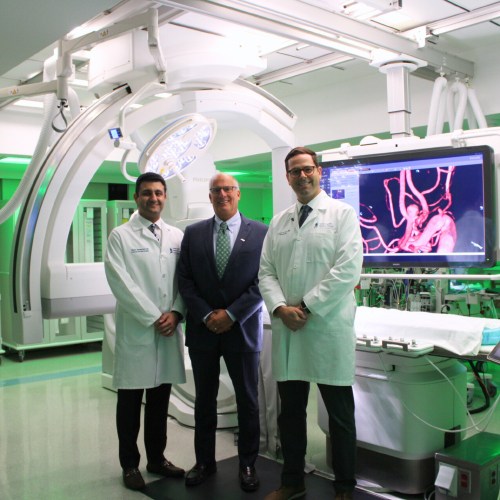
Reading Hospital has received Joint Commission certification as an Advanced Comprehensive Stroke Center.
With this accreditation, Reading Hospital is now endorsed to provide the highest-level stroke care, as a Comprehensive Stroke Center, and is also listed among the top five percent of accredited centers in the nation.
About CSC Certification
This certification is the most demanding level of accreditation a stroke center can achieve, and it is awarded following a rigorous evaluation process. It demonstrates that the Reading Hospital Stroke Center can receive and treat the most complex stroke cases, as well as aneurysms and serious neurological conditions, at any time of the day or night.
“This recognition highlights our superior clinical quality, our team's exceptional skill, and our staff members' ability to work together to support patient care,” said Charles F. Barbera, MD, Reading Hospital President and CEO. “Virtually every department in the hospital played a crucial role in this process, and I thank them for their dedication to our patients and the hospital."
A stroke patient's outcome depends on how and when they are treated. While a Primary Stroke Center (PSC) can treat most ischemic strokes, a Comprehensive Stroke Center is prepared to handle all types of stroke thanks to around-the-clock access to advanced imaging capabilities, neurointerventionalists, neurosurgeons, and a neuro-intensive patient care unit, among other advancements.
CSC-certified hospitals offer specialized abilities to receive and treat all strokes - even the most complex cases - and are committed to the ongoing performance-based evaluation and evolution of care for stroke patients at every touch point in the care continuum.
“Data from the American Heart Association shows us that someone in the United States dies of a stroke every three minutes and 14 seconds,” said Brandon Root, MD, Tower Health Medical Group Neurosurgery – West Reading. “This prestigious accreditation is significant because it formalizes our commitment to providing the highest, most advanced care to the communities we serve.”
CSC Standardized Performance Measures
Reading Hospital, which has also been recognized by Healthgrades as one of America’s 100 Best Hospitals for Stroke Care for the past two years, had to meet or exceed several standards to earn comprehensive stroke status, including:
- Advanced imaging capabilities are offered 24/7 for stroke care.
- Neuroradiologists on staff to provide expert interpretation of advanced brain imaging and to assist with emerging treatment decisions.
- Neurointerventionists treat patients using minimally invasive techniques and are available 24/7 to quickly remove blood clots from brain vessels and restore blood flow to preserve brain tissue.
- Vascular neurosurgeons specialize in treating blood vessel abnormalities in the brain, such as an aneurysm (a bulging in an artery). This team of sub-specialized neurosurgeons performs precise procedures to clip or coil the aneurysm to reduce the risk of further bleeding.
- Vascular surgeons treat carotid stenosis using surgical procedures, stenting, and trans-carotid stenting (TCAR).
- Dedicated neuro-intensive patient care unit that provides advanced multimodality monitoring 24/7.
- Neurointensivists specialize in acute brain disorders and treating life-threatening medical complications that are impacted by a stroke, often involving the heart, lungs, and kidneys.
- Active in stroke research. The clinical team studies the effects and care of stroke to help improve outcomes.
“Every year, the Reading Hospital team treats more than 1,000 stroke patients,” said Shahin Manoochehri, MD, Tower Health Medical Group Neurosurgery – West Reading. “Providing this high level of care will have a real and lasting impact on our patients and their families.”
